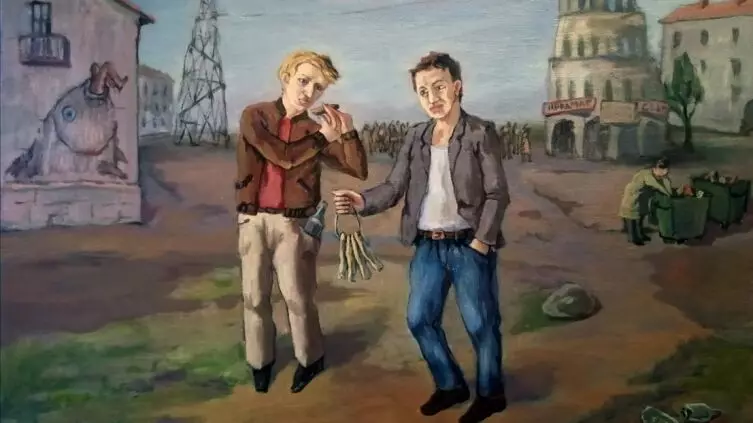
Once I lived in Moscow, and I lived on the street with a strange name Red Kazan. The strangeness of the name lasted until I, after half of Muscovites, who lived here, pronounced the second word with an emphasis on the last syllable. What kind of cauldron and why he is red, none of the saying was thought. But once I put an emphasis on the second syllable, and everything fell into place.
Red Kazánets! The street was named after the workers of the locomotive workshops of the Kazan Railway, which in 1919 staged a first subbotnik, fixing several steam locomotives in a spontaneous time. By the way, trains that shrew under the windows of houses on the street Red Kazan and the day, and at night, went to the Kazan station of Moscow.
V. I. Lenin, having learned about the voluntary work of the railway workers, called him the great soten and even wrote an article with such a name. The outline of this article was mandatory for all students in Marxism-Leninism. The shock part of it was the phrase that the most important for the victory of a new social system is labor productivity. The leader was confident that socialism would create a higher productivity and will win. People we have good, like the Red Kazan, you only need to organize them correctly. And yes, even accounting and control.
It turned out that the practice was very different from the theory. The workers did not swallow the plan, they were wary to the Stakhanians, and the development of the rules reacted with poorly hidden angry. Labor productivity increased only with the help of advertising. As mentioned, without tufts and ammonals did not build a b channel!
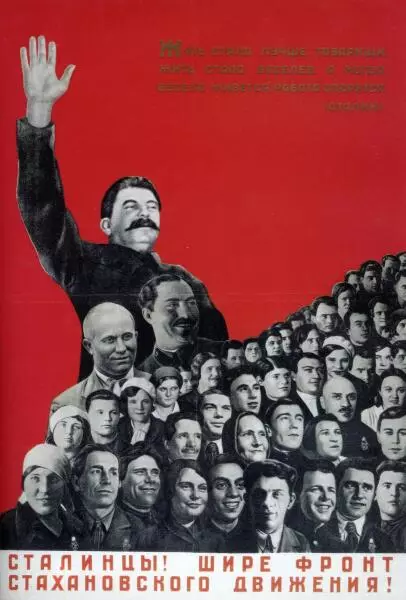
By the way, about the channel. Gulag Yes, the collective farm is all that Soviet power in the field of production organization was able to achieve. Both were reborn in the twentieth century forms of slave labor.
But slave labor is unproductive. This is best understood by the main supervisor over slaves. Therefore, when he needed to achieve real and modern results, he achieved them, slightly improving the condition of the content of the contingent and resolving conversations in the ranks. Maybe for it, in the end, and shot more orthodox comrades.
But the need to develop defense industries made them badly introduce technical progress even in the most deaf corners of the country. As a result, the real productivity of labor has grown up.
And here for party leaders, a dangerous fact turned out: he could have unemployment! In general, she has already appeared. The giant plants did not need thousands of working mass professions. And it was impossible to get rid of them! What did the Stalinist Constitution say?
Citizens of the USSR are entitled to work, that is, the right to receive guaranteed work with the payment of their labor in accordance with its number and quality. The right to work is provided by the socialist organization of the national economy, the steady increase in the productive forces of Soviet society, eliminating the possibility of economic crises and the elimination of unemployment.It was actually impossible to dismiss the employee. And it was not possible to translate to another place. Unless under the convoy, as a specialkotent guide.
That's where Rule! What, and to organize violence from Soviet leaders it turned out better than to organize modern production. It turned out that the Constitution was another article, less benevolent, in which labor was declared not only as the right, but also as a duty too:
Labor in the USSR is the responsibility and case of the honor of each citizen who is capable of labor on the principle: "Who does not work, he does not eat." In the USSR, the principle of socialism is carried out: "From each of its ability, everyone - according to his work.And then everything is simple. Do not go to work - violate the basic law. Do not work, but eat? So we will make you work, TUNADETS!
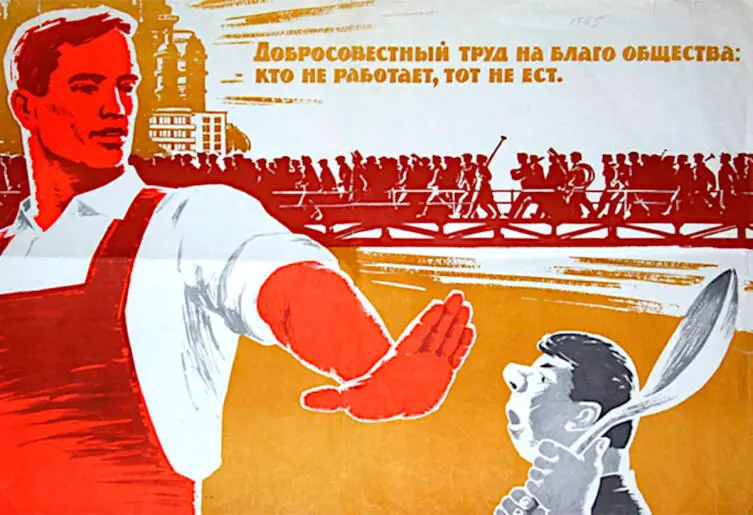
By the way, was you not surprised by this ancient word "Tunes", suddenly appeared in the Russian Soviet language and in it held?
The fact that this complex word is ancient, it is visible at least because it is made up of two parts, and both parts are obviously the words of Church Slavonic, that is, a long time ago from the use of released.
- The adverb "Wow", that is, the "gift", and the noun "nadeuss", that is, "eartures", together form the word meaning "the one who eats, not giving anything in return."
Another evidence of the ancient Suceeness of the word "Tunes" is that instead of it, we most often use it to transfer to the modern Russian - "Darmot". By the way, in the related Russian Slavic languages, the new form completely won: in Ukrainian - "Darmology", in Belarusian - "Darmeysts".
Why in Russian, the old fashioned word did not die? The answer is only one: it is often used.
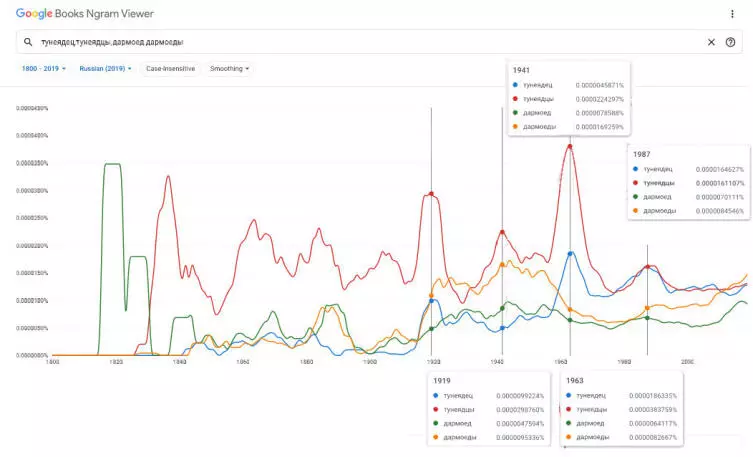
In use of this word in Soviet times there are two peaks. The first, approximately in 1919, was initiated by the article "Great Poor". Lenin, because he was competent and studied in the gymnasium, preferred to use several sublime "tunes" instead of the "Darmothe", which sounded still too common. His article was repeatedly reprinted, and its abstracts were repeated in the articles of Bolshevik propagandists and agitators. Therefore, the word "Tuneshi" was entrenched, at least in the jargon of the partpalitis.
It was this jargon that Nikita Sergeevich Khrushchev (1894-1971), when she worked on the party staircase. Unlike the Great Leader, he was not literate, he studied only in church-parish school. But since the school was church-parish, the archaic word "Tunesez" there, of course, heard. And when, after many years, I decided to force those who learn from productive work, remembered him and used.
On May 4, 1961, the law "On strengthening the struggle against persons evading social and useful work and leading an antisocial parasitic lifestyle" was published. For simplicity of the subjects of this law, they began to call TUneev. The law was accompanied by a wave of articles and books about the fight against TUneev, thanks to which, in the 1963 region, you can observe the second peak in the use of this word in Russian.
The decree of the TUnevtsy, as well as the Article of the Criminal Code, the Life of the Soviet country, was not strong, but influenced the Soviet culture, affect the biography of at least two poets, which now is proud of Russia.
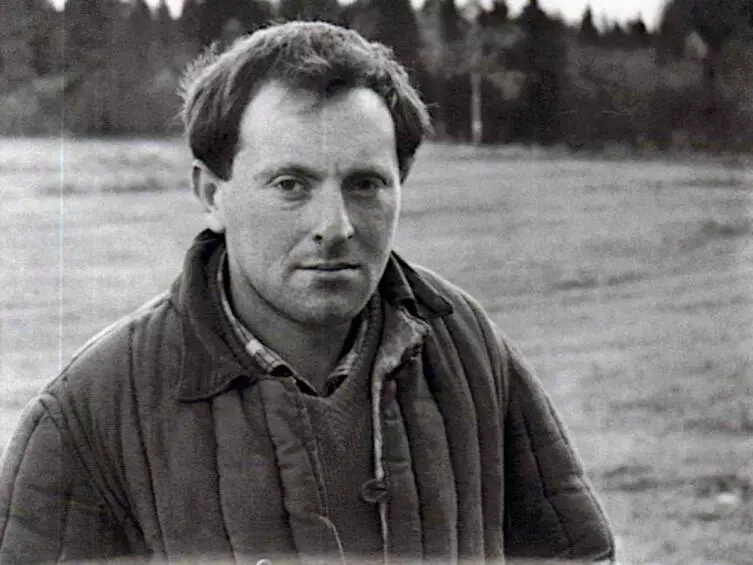
The first among the famous Soviet Tunevans is of course, the Nobel Prize winner Joseph Brodsky (1940-1994). The process above it is postfactum shows how it just turned out to bring any person to a repressive law. It was also a signal to others: they can fall to everyone. However, the prophetically experienced in such affairs A. Akhmatova: "What kind of biography make our red!"
Brodsky sentenced to five years of reference to the Arkhangelsk region to the village of Norinskaya. He lived there only a year and a half, and, according to the recognition of Brodsky himself, it was the best period of his life. However, one should not bless the persecutors, although the Gospel calls for this.
Another famous poet and musician - Viktor Tsoi (1962-1990) - almost fell under the article "Tuneshi". He did not in the creative union and did not work in the philharmonic, so the writing and performance of the songs for him was not labor activity. V. Tsiu had to get a stitch to the boiler room in 1986. Now on this house on Blokhin Street, 15 in St. Petersburg there is a memorial plaque.
Glory to Labor!
Author - Mark Blau
Source - Springzhizni.ru.
